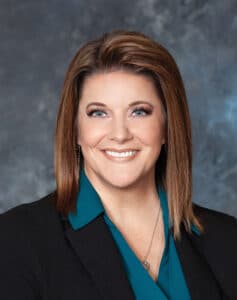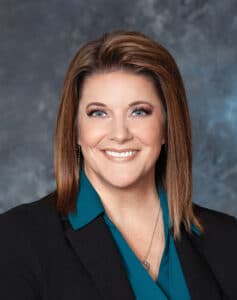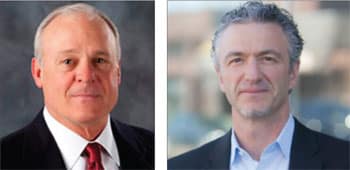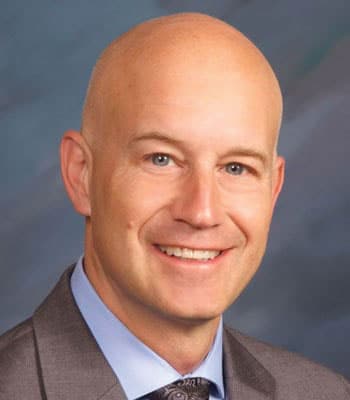Kim Collins brings administrative, clinical skills to North Range

GREELEY — When Kim Collins of Greeley learned that Larry Pottorff was retiring as the CEO of North Range Behavioral Health, she hoped someone who understands “this work, this community and this agency” would take over.
“(Through) dialog with our community partners and our internal system, it became clear to me I know the areas where we’re struggling. I know the areas where we’re amazing,” Collins said. “I know Larry’s heart and the heart of North Range, and I know our values. I know our strengths, and I know our areas of growth as an agency.”
Collins stepped into the role of CEO of the Weld County agency on Nov. 1, one month before Pottorff officially retired on Dec. 1. Pottorff was the CEO for 12 years and with North Range for 39 years.
“He has done an amazing job of really creating a wonderful agency and maintaining a wonderful agency,” Collins said. “He has a heart for clients, and he has a heart for our community.”

Collins is the first female CEO of North Range on the footsteps of “incredible CEOs who happen to be men,” she said.
“I’m so excited, and I’m so in awe,” Collins said. “I’m excited some of our staff members get to see representation at all levels of a lot of different people.”
Collins describes North Range as being neither a perfect system, nor a broken system, but it is something she wants to improve, while being sure to retain what is working. To do this, she has three primary goals for her next year as CEO — navigating the state’s new Behavioral Health Administration, addressing a workforce shortage and replacing a large number of management-level employees who retired in the past year.
The BHA, housed within the Department of Human Services, coordinates and collaborates care across state agencies that provide behavioral health services.
“With that naturally will come changes,” Collins said. “It will be making sure our system is prepared to be nimble enough to pivot and to embrace some of the changes that are coming down the pike for us.”
At the same time, North Range is facing a workforce shortage, which the agency will address by evaluating what is working for employees and getting feedback from job candidates and employees who left the system, Collins said.
“What changes can we make so we’re an employer of choice?” Collins said. “We want people to want to work for us. … We will adjust the system to recruit and retain really talented staff.”
Along with normal attrition, North Range has additional positions to fill from eight retirements.
“There’s always an element of excitement and an element of anxiety,” Collins said. “We just need to stay on our toes to make sure that we’re preparing our replacement folks … so they can bring a breath of fresh air and innovation and fill in the gaps … as quickly as possible.”
Behavioral health is seeing changes at the state level but also at the national level, in part brought on by the COVID-19 pandemic, which de-stigmatized mental health care from the isolation, disconnectedness and higher rates of depression and anxiety brought on by stay-at-home orders. Providers responded by adjusting care delivery, such as introducing telehealth appointments that no longer have to be in an office setting and shorter sessions in solution-focused brief therapy.
“There is a lot of need out there,” Collins said. “So many people are coming forward wanting to talk to somebody.”
Behavioral health is complex with multiple factors coming into play, such as a combination of substance abuse and mental health issues, which may be situational or lifelong. Solutions aren’t quick and simple but might involve medication, therapy, psychoeducation and anger management services.
On the business side, there are different payer sources and grant and funding streams balanced against serving clients ethically and appropriately while being fiscally responsible, Collins said. Clients may ask for services North Range doesn’t currently provide, and the agency will respond by filling that need or offering something else that is even more helpful, she said.
“Our staff is amazing at really identifying what does a client need, what a client wants and what is in their best interest,” Collins said. “How can we fill in the gaps even if it’s not traditionally done?”
Collins worked for eight years for North Range before becoming CEO. She served as administrative director for seven years, overseeing the youth and family programs and the crisis-response team, then became the chief clinical officer in charge of service delivery. She also was director of clinical programs at Diversus Health in Colorado Springs, formerly Aspen Pointe, where she worked for three years, and regional operations director at Centennial Mental Health for three Eastern Colorado counties. She worked there for six years, starting out as a clinician and early childhood specialist. She also was an adjunct professor at Morgan Community College in Fort Morgan.
“As a clinician, I served families, substance abuse, rural areas and children in schools. That was wonderful to help me understand clinical work,” Collins said. “It helped me understand client needs and how complex it is. There is no one answer and resources are limited.”
Collins holds a bachelor’s of science degree in human development and family relations and a master’s of science degree in education, focused on community counseling. She became a licensed professional counselor in Colorado in 2007.
Through much of her career, Collins took on increasingly responsible positions, such as supervisor, manager, director, administrative director and chief clinical officer.
“Every time that I’ve switched positions, I’ve been able to really see the mental health system from different perspectives and understand the different challenges at each level,” Collins said. “The challenges on the ground floor seeing the clients is different than the challenges from (the view of) of the chief clinical officer or CEO.”
Getting different views of North Range’s operations will help Collins evaluate how to move the system forward and positively impact client care, she said.
“I know enough about our system and the delivery of care, I can look now from the CEO lens and make impactful changes and also not change things that don’t need to be changed because they are working and clients are benefiting from them,” Collins said.
Collins has the leadership skills to make those changes, according to her staff.
“Kim has been a skilled clinician and sincere leader who invites feedback,” said Tamara McCoy, administrative director. “I have seen her serve in many capacities here at North Range, and I’m confident she’s going to lead us in a courageous and inspiring way.”
Liz Faris, also an administrative director, agrees.
“Kim Collins is a courageous, skillful leader who provides a vision of passion to serve our clients in the best way possible,” Faris said.
As part of that leadership, Collins likes learning about the different teams at North Range, such as information technology, operations and data software.
“I knew how to navigate them to get the clinical information I needed. I didn’t know the inner workings of how the programs are and how the teams function,” Collins said. “It’s kind of cool to see passion and creativity and innovation that I didn’t even know was there. … They are behind-the-scenes heroes who make our system come off in such a beautiful way.”
Source: BizWest



